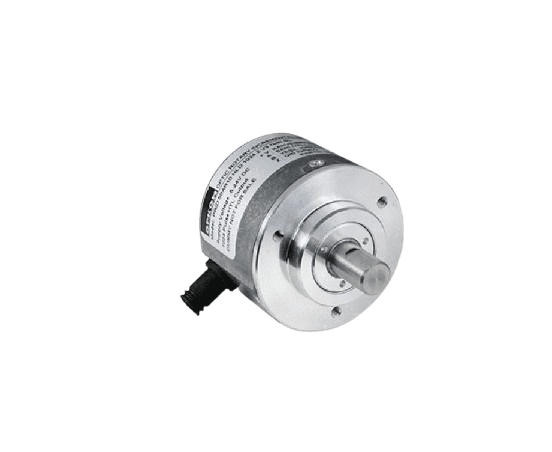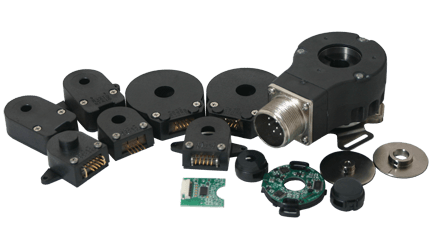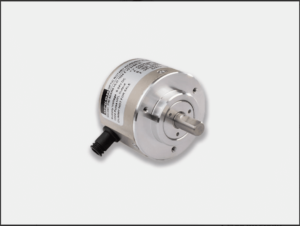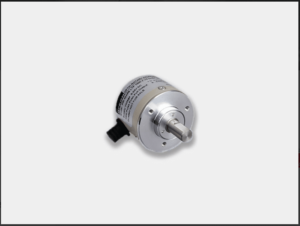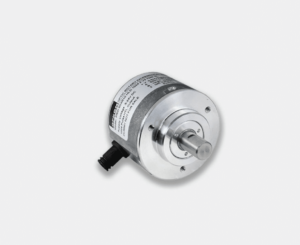Magnetic Encoders in Industrial Automation Magnetic encoders play a vital role in industrial automation, offering precise and reliable position feedback across a wide range of…
Magnetic Encoders in Industrial Automation
Magnetic encoders play a vital role in industrial automation, offering precise and reliable position feedback across a wide range of applications. Known for their robustness and resistance to environmental conditions, these encoders are a preferred solution in harsh industrial environments where dust, oil, or vibrations can disrupt optical alternatives such as optical encoders.
In motion control systems, magnetic encoders help regulate speed, monitor angular position, and synchronize movements in real time. Their integration into servo motors, robotic arms, and CNC machinery ensures accurate control and efficient operation, supporting automated workflows from manufacturing lines to automated storage systems. Thanks to their contactless sensing technology, they deliver consistent results with minimal wear, reducing maintenance and increasing uptime in critical automation systems. In many installations, they are considered superior to traditional rotary encoders and optical encoders, particularly for environments requiring greater reliability. These systems benefit greatly from integrated magnetic sensors and stable power supply units that ensure uninterrupted performance.
Introduction to Magnetic Encoders
Definition and Overview
Magnetic encoders are devices that use magnetic fields to detect rotational or linear movement and convert it into digital or analog signals. Unlike optical encoders, which rely on light patterns, magnetic encoders detect changes in magnetic polarity or field strength using sensors such as Hall effect or magnetoresistive elements. These magnetic sensors provide robust and accurate feedback in both rotary and linear configurations.
These encoders are available in several forms:
- Rotary magnetic encoders, which measure angular movement.
- Linear magnetic encoders, which track straight-line displacement.
- Incremental and absolute variants, catering to different resolution and positional tracking needs.
Due to their rugged design and sealed housing options, magnetic encoders are often chosen for environments where debris, moisture, or extreme temperatures could compromise optical sensors. Compared to other rotary encoders, magnetic encoders offer improved immunity to environmental interference while still providing high-resolution data.
Importance in Industrial Automation
In industrial automation, magnetic encoders are essential for delivering real-time feedback in systems where precise motion control is non-negotiable. Their role is particularly significant in applications involving:
- Servo and stepper motors
- Conveyor systems
- Automated guided vehicles (AGVs)
- Robotics and machine tools
The use of incremental magnetic encoders provides high-resolution pulse outputs for speed control, while absolute magnetic encoders offer exact positional data, critical during power interruptions or startup sequences. These incremental encoders are widely adopted across industries due to their accuracy, compact form factor, and ability to integrate seamlessly with PLCs and other control systems.
Types of Magnetic Encoders
Magnetic encoders come in several types to suit specific industrial requirements. From compact rotary designs to advanced multi-turn systems, each encoder type offers distinct functionality for position and motion feedback. Understanding the differences between them helps in selecting the most suitable solution for automation systems, motor control, and machine feedback.
Rotary Magnetic Encoders
Rotary magnetic encoders measure the angular position of a rotating shaft using magnetic field detection. They are ideal for servo motors, robotic joints, and industrial machinery, where continuous rotational tracking is required. These encoders are typically more rugged than optical encoders, offering reliable operation in dirty, oily, or vibrating environments.
Their non-contact sensing technology minimizes mechanical wear, and their output signals can be configured in incremental or absolute formats. Rotary magnetic encoders are widely used in motion control systems, factory automation, and CNC applications where precise angular positioning and rotational position tracking are critical. Many systems that previously relied on rotary encoders are now transitioning to magnetic alternatives due to their durability and reduced maintenance needs.
Single-Turn Magnetic Encoders
Single-turn magnetic encoders determine the position of a shaft within one full 360° rotation. They provide absolute position feedback for each angle within a single turn, resetting after a complete rotation. This makes them ideal for robot arms, tool changers, and precision actuators where knowing the position within one rotation is sufficient.
These encoders are valued for their compact size, digital signal output, and high accuracy in confined spaces. Their robustness and ability to maintain performance in harsh industrial environments make them a reliable choice for equipment operating in dust, oil, or moisture-heavy conditions.
Multi-Turn Magnetic Encoders
Multi-turn magnetic encoders extend the functionality of single-turn models by tracking the number of full rotations in addition to angular position. Using either gear-based or battery-free magnetic systems, they store rotational counts even during power loss—ideal for applications requiring long-range positioning or precise tracking across multiple turns.
Commonly used in elevators, conveyor systems, and automated warehouse robots, multi-turn encoders provide a continuous and absolute position over multiple revolutions. Their ability to function without physical contact reduces wear, supports maintenance-free operation, and ensures accuracy in complex automation tasks.
These encoders are often favored across a range of industries due to their durability, precision, and integration flexibility. They also offer an alternative to traditional optical and rotary encoders where contamination or space constraints are a concern. In many of these solutions, hollow shaft encoder configurations are used to simplify mounting and reduce mechanical stress.
Non-Contact Magnetic Encoders
Advantages Over Contact Encoders
Unlike traditional contact-based encoders that depend on brushes or mechanical wipers, non-contact magnetic encoders eliminate physical wear by removing friction-based components altogether. This results in several clear advantages:
- Extended service life due to the absence of mechanical degradation
- Minimal maintenance, reducing downtime and operational costs
- Consistent signal quality, even in high-speed or high-vibration applications
- Improved resistance to contamination from dust, oil, and metal shavings
The encoder’s ability to output stable, high-resolution signals—such as square wave, quadrature, or digital position feedback—makes it a reliable choice for motion control systems across industrial environments. These advantages have led many manufacturers to favor magnetic solutions over traditional incremental encoders or optical encoders.
Applications in Harsh Environments
Non-contact magnetic encoders are purpose-built for harsh industrial environments where conventional sensors may fail. Their sealed construction and contactless operation allow them to maintain performance under exposure to:
- High humidity or moisture
- Extreme temperatures
- Dust, grease, and debris
- Mechanical shocks or vibrations
This makes them the preferred solution in sectors like automotive manufacturing, mining, food processing, and renewable energy systems. Whether embedded in motor shaft feedback systems, robotic actuators, or conveyor belt automation, non-contact magnetic encoders ensure reliable operation and precise control under the most demanding conditions. In such environments, magnetic encoders often outperform optical encoders in terms of reliability and longevity. Integration with a consistent and regulated power supply further enhances system stability and performance.
Key Functions of Magnetic Encoders
Position Control
One of the primary roles is position control. Whether incremental or absolute, these encoders track the angular or linear position of a shaft or component with high precision. In rotary applications, such as servo drives or robotic joints, they provide the system with continuous updates on the shaft position or angular displacement.
Absolute magnetic encoders are particularly effective for systems that require power-loss recovery, as they retain the exact position even after shutdowns. This is critical in equipment where accurate reinitialization is required, such as automated assembly lines, packaging machinery, and medical devices.
Motion Control
Magnetic encoders are equally crucial in motion control applications. They generate signals that reflect both direction of rotation and speed, enabling dynamic adjustments in motors and drives. This feedback loop is fundamental in systems where smooth and responsive motion is essential—such as robotic arms, conveyor systems, and industrial gantries.
By outputting pulses per revolution or digital signals, incremental encoders allow precise monitoring of motor velocity, while absolute encoders provide comprehensive data for closed-loop control systems. The non-contact design of magnetic encoders ensures this motion data remains accurate even in high-speed or high-load operations, making them ideal for automated industrial processes requiring tight control and repeatable movements.
Advantages of Magnetic Encoders
Robust Performance
Magnetic encoders are engineered for rugged environments, where dust, oil, moisture, or mechanical vibration would compromise optical or mechanical alternatives. Thanks to their non-contact sensing design and sealed construction, these encoders maintain optimal functionality even in the presence of contamination or temperature extremes.
Their immunity to shock and vibration makes them ideal for high-speed motion control in automotive, aerospace, and heavy manufacturing sectors. Whether mounted on a motor shaft or embedded in a robotic joint, magnetic encoders deliver stable output signals under continuous stress.
Enhanced Accuracy and Reliability
Magnetic encoders provide precise position feedback and accurate rotational tracking, critical for closed-loop systems that rely on real-time control. Their use of magnetic poles and digital output signals allows for high-resolution readings with minimal error, ensuring reliable operation across long duty cycles.
Unlike contact-based encoders, magnetic versions are not subject to performance drift due to wear. This reliability makes them a trusted solution for linear positioning, speed monitoring, and directional sensing in automated production environments.
Extended Device Lifespan
The absence of friction and moving contact parts gives magnetic encoders a major edge in longevity. With no physical wear during operation, these devices maintain performance standards over time, reducing the need for replacements or recalibration.
This extended lifespan translates to lower total cost of ownership, particularly in systems where continuous operation and low maintenance are essential. In industries where unplanned downtime can result in costly disruptions, magnetic encoders provide a long-lasting, maintenance-free solution that supports productivity and system uptime.
Applications of Magnetic Encoders
Manufacturing
In manufacturing environments, magnetic encoders are crucial for real-time position feedback and motion control on production lines. They are often embedded in:
- Robotic arms for accurate articulation and joint feedback
- Servo motors for dynamic speed regulation and rotational accuracy
- CNC machinery for precise cutting, drilling, and shaping operations
Rotary magnetic encoders ensure synchronized movements between multiple axes, enabling high-speed, high-precision automation in industries such as automotive, electronics, packaging, and metal fabrication. Their non-contact construction also allows uninterrupted operation in the presence of oil, dust, or debris.
Resource Management
In sectors focused on resource extraction and handling, such as mining, water treatment, or renewable energy, magnetic encoders support durable, long-term performance under extreme environmental conditions. They are used in:
- Wind turbines, for monitoring blade pitch and rotation
- Mining equipment, for tracking conveyor and hoist motor positions
- Water treatment facilities, for regulating valve and actuator positions
The robust performance and shock resistance of magnetic encoders make them ideal for harsh environments, where mechanical encoders would quickly degrade or fail. Some designs also feature stainless steel housings for maximum protection against corrosion.
Process Control
Magnetic encoders are central to modern process control systems, delivering continuous feedback to programmable logic controllers (PLCs) and industrial computers. This enables accurate monitoring and adjustment of:
- Conveyor belt systems in logistics and distribution
- Filling and bottling machines in food and beverage production
- Assembly systems in electronics and precision manufacturing
With high-resolution output, directional feedback, and excellent performance stability, magnetic encoders help optimize system timing, product flow, and equipment synchronization. Their role in improving efficiency and reducing waste has made them a key component in smart factory and Industry 4.0 implementations.
Integration with Advanced Technologies
Improving Productivity
When paired with intelligent motion control systems, magnetic encoders contribute directly to increased productivity. Their precise position and motion feedback allow machines to operate at higher speeds without compromising accuracy. This results in:
- Faster cycle times in automated manufacturing lines
- Reduced downtime through predictive maintenance
- Smoother motor control in multi-axis robotic systems
By delivering reliable encoder signals in real time, magnetic encoders enable dynamic adjustment of system parameters, allowing production equipment to respond to changing demands without manual intervention. This level of automation ensures that output is optimized, resources are used efficiently, and operational delays are minimized.
Enhancing Quality and Flexibility
Magnetic encoders play a vital role in maintaining consistent product quality and enabling production flexibility. Their ability to deliver exact position feedback ensures components are aligned, cut, filled, or welded with extreme precision—regardless of production speed or batch variation.
In addition, these encoders support flexible manufacturing systems by allowing equipment to switch seamlessly between different product configurations. Applications like servo motor positioning, robotic path control, and adaptive packaging machinery benefit from the high responsiveness and resolution of magnetic rotary encoders.
With growing emphasis on customization, modular production, and zero-defect manufacturing, the integration of magnetic encoders into advanced technologies is essential for achieving both quality assurance and operational agility.
Broader integration with Safety & Automation Systems
In modern industrial environments, Magnetic Encoders are only one part of an integrated safety architecture. These systems will work in tandem with various critical components such as safety PLCs, safety contactors or safety light curtains (including muting light curtains) to ensure real-time hazard detection and safe machine shutdown. Common peripheral safety devices like the emergency stop button, two hand station, and emergency stop rope pull are all effectively managed by the safety PLC’s logic structure.
Advanced installations frequently incorporate safety relays, safety non-contact switches, RFID switches, mechanical interlock switches, and solenoid locking switches—each adding specific protective functions to the machinery. To maintain continuous system health, engineers also deploy standstill monitors, speed monitors, soft starters, and reversing contactors within their automation frameworks. For measuring the product itself, solutions such as measurement light curtains can be integrated.
Beyond motion and logic safety, electrical condition monitoring is equally essential. Devices like insulation monitors, battery monitors, current monitors, voltage monitoring relays, phase sequence relays, under voltage relays, and undercurrent monitoring relays are often integrated to detect anomalies in power flow or equipment performance, with this data displayable on HMI Touch Panels or similar systems. To support reliable operation, high-quality power relays and regulated power supplies are essential.
